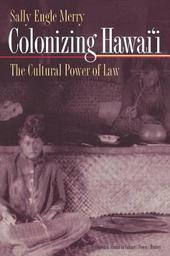
|
Colonizing Hawai'i: The Cultural Power of Law
Paperback / softback
Main Details
Description
How does law transform family, sexuality, and community in the fractured social world characteristic of the colonizing process? The law was a cornerstone of the so-called civilizing process of nineteenth-century colonialism. It was simultaneously a means of transformation and a marker of the seductive idea of civilization. Sally Engle Merry reveals how, in Hawai'i, indigenous Hawaiian law was displaced by a transplanted Anglo-American law as global movements of capitalism, Christianity, and imperialism swept across the islands. The new law brought novel systems of courts, prisons, and conceptions of discipline and dramatically changed the marriage patterns, work lives, and sexual conduct of the indigenous people of Hawai'i.
Author Biography
Sally Engle Merry is Class of 1949 Professor of Ethics in the Anthropology Department at Wellesley College. Her books include Urban Danger: Life in a Neighborhood of Strangers, Getting Justice and Getting Even: Legal Consciousness among Working-Class Americans, and The Possibility of Popular Justice: A Case Study of American Community Mediation, coedited with Neal Milner. She is currently president of the Association for Political and Legal Anthropology.
ReviewsWinner of the 2002 Williard Hurst Prize in Legal History
|